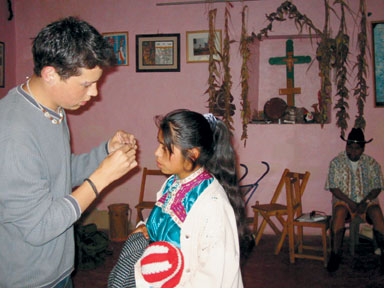Voices: The World was Paralyzed |
| Printer-friendly version | Email this article |
|
—Edited from an essay by Reynaldo Pacheco ’06
The world was paralyzed; voices and sounds swallowed up. Only my fingers moved, caressing a silky skin of sand. The actors watched me in fear.
I had come to San Cristobal de Las Casas for one month to direct Sna Jtz ‘ibajon, a Mayan theater troupe. We were to perform in a pueblo outside of town, but for three weeks we rehearsed in a small house along a colonial street. Today, I was working with Socorro’s makeup.
Her eyes were like wet rocks, like the stones I played with as a child along the bank of the Bolivian River. I used to believe those stones were alive.
Socorro’s eyes were the vibrant voice of a culture afraid to be touched and felt. She was 20 years old, like me. But she and the other indigenous people greeted each other with a timid handshake. And here I was, looking at her eyes, touching her face.
"We have to do something with your makeup to give you a look of suffering," I said.
She smiled, exposing worn-out and uncared-for teeth. She was missing one.
I felt ashamed. How dare I ask her to pretend to be someone she already was? Here was a woman with few belongings. Her priority should have been merely to survive. Yet she was doing theater, doing art.
Her eyes, her smile helped me to see: this room with a floor of splintered wood and dust, tread upon hour after hour, worn out by art. Green, yellow, and blue paper masks on one wall, and another alive with color and a fusion of religions—a cross both Mayan and Christian. The gloomy corners held props and musical instruments—sticks, rocks, pieces of leather—underneath a tarnished mirror, a century old.
"Rey, Rey," a voice called. "Are you okay?"
I looked into the mirror to see the indigenous actors behind me. They stared back with momentary fascination.
"Yes…I was thinking about the makeup we should use," I said, pulling my eyes from the mirror. "We will not have much time to work on Socorro’s face. Do you know if we will have a dressing room?"
Their loud laughs bounced off those four walls like bats in a cave. Diego, the eldest, silenced them with a gesture.
"We are going to a village eight hours from here in the middle of the jungle," he said. "We won’t have a stage, so I doubt there will be dressing rooms."
Even as they laughed, I began to sense the scale of the risk we would be sharing.
"We will perform in the country, in the plaza, and in the fields," he said. "Wherever the people will receive our message, that’s where we will be. Our audience will be children, animals, crazy old men, drunkards, ladies, shamen…"
A month earlier when I first read the script of their play, I had not understood their art. The theme was political—immigration. The lines repetitious. The dialogue so simple. I was frustrated. Why don’t they narrate their colorful festivals, I thought. The processions to the cemetery? Why not show your culture? Why immigration? Why not perform an indigenous play in an indigenous place?
But with Diego’s words I realized that troupe shared with Shakespeare the need to play to our audience—an audience of different ages and backgrounds, surrounded by animals and nature. Our message would be slapped down with laughter, spitting, barks, and dismissal. Our only weapons would be repetition. And our imaginations. We shared the artist’s duty to spread a message of the moment—even a controversial topic like immigration. Finally, it was all making sense.
"Then we have to find a makeup that will imitate bruises and marks from punches, and do it quickly." Socorro was smiling at me.
I nodded and grabbed a piece of carbon paper, dipping it in black ink, and scouring the skin around my right eye, marking my pain.
"It works well, Rey," Xun said. "But your face is white, and the black ink stands out. We are brown, and no one will notice."
I turned to the mirror—a mestizo from Bolivia with a bruised face—while indigenous people from Chamula and Zinacantan circled behind me. I was living the consequence of the Conquest. No book, no teacher, no movie or documentary could have made me so realize this mixture of different races and cultures, raped and forced to live together. We were a result of history. A fusion—like the Mayan and Christian crosses—a vivid fusion of indigenous people.
I turned and hugged them. Tears soaked their faces and hair. I closed the circle with my arms and thanked them for a month of living together, for the sharing, for letting me take a picture of their souls, for fresh fruit at the end of every rehearsal. The splintered, dusty floor was bathed with our tears. The color of our skins, our history, and our customs did not matter. Our hearts beat equally, and our tears are just human.
My voice was wrecked. We ended that day’s rehearsal. And I walked down those colonial streets knowing I was only a student, and not the teacher they thought they had hired.
Contact Pacheco at pachecor@wabash.edu
|

 In 2004, this photo of Bolivian-born Reynaldo Pacheco ’05 directing a young Mayan actress in Mexico won the College’s International Photo Contest. The story behind the picture:
In 2004, this photo of Bolivian-born Reynaldo Pacheco ’05 directing a young Mayan actress in Mexico won the College’s International Photo Contest. The story behind the picture: